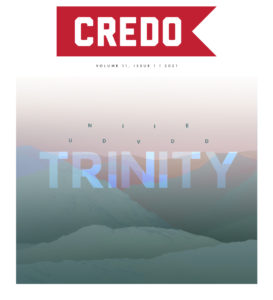
Simplicity and Trinity, Friends or Foes?
T he new issue of Credo Magazine focuses on the trinity. The following is an excerpt from one of the issue’s featured articles with Ryan Hurd. Hurd is a teaching fellow at The Davenant Institute and is systematic theologian whose area of expertise is doctrine of God, specifically the Trinity. He has written a number of articles and regularly does translations of early modern theology sources; but his primary project is writing a systematics of the Trinity. He is currently a doctoral student at Theologische Universiteit Kampen.
he new issue of Credo Magazine focuses on the trinity. The following is an excerpt from one of the issue’s featured articles with Ryan Hurd. Hurd is a teaching fellow at The Davenant Institute and is systematic theologian whose area of expertise is doctrine of God, specifically the Trinity. He has written a number of articles and regularly does translations of early modern theology sources; but his primary project is writing a systematics of the Trinity. He is currently a doctoral student at Theologische Universiteit Kampen.
In elementary terms, how does the doctrine of simplicity relate to the doctrine of the sacred Trinity? The answer is, simplicity is provisional, among other things, for gaining insight into God himself as Trinity, Father, Son, Spirit. Simplicity is part of the prolegomena for trinitarian teaching, because simplicity is in the cement of any monotheism and so inherent to the stability of anything built upon the basic judgement which affirms merely that God is and nothing more (quia est et nihil amplius, Thomas Aquinas says). God is, and God is Trinity: inasmuch as simplicity is invoked in saying the first, so much is it involved in saying the second
We must not say too much or too little on this point. We must be very precise. To say too much, takes theology as a servant of the church, inverts it, and makes it a crushing load too heavy to bear (Luke 11:46). To say too little, takes theology as a help for knowing and loving God more, divests it of this capacity, and makes it worthless for bringing people closer to God. Let us first remind ourselves of the basics of the doctrine of simplicity, before turning to consider how it is ancillary for confessing God as Father, Son, and Holy Spirit.
A Primer on Simplicity
We must not say too much or too little on this point. We must be very precise. Click To Tweet What the doctrine of the Trinity is, is roughly known; but what is the doctrine of simplicity? In theology proper, simplicity is a negative name we utter of God. The doctrine of simplicity in no way posits or affirms something of God. Confessing simplicity is nothing else but negating or denying composition of God. “Simplicity,” throughout theology proper, means nothing else but the judgment, God is not composite.
Broadly, the name “simplicity” signifies any judgment removing from God a real composition; more specifically, it signifies the final intellectual judgment that has removed from God the fundamental composition among creatures, that of “esse and essentia,” “being and essence.” This judgment is final, because when it is made, ipso facto all other ways of composition have already been removed in the same stroke. The expression of this judgment and thus the final dogmatic statement pronounced by the catholic church on the doctrine of simplicity was provided first in 1215 at Lateran IV, at least in any official way; the first theologian to expound this statement with significant profundity was Thomas Aquinas, who was born closely thereafter (1224/25).
Picking up the phrase given at Lateran IV, he says, “Deus omnino simplex est”: God is not composed in any way; or, in another place, pushing this even further, he says, It is not possible that God be composed in any way. Either of these can be and is reformulated and declared as the doctrine of simplicity, where we confess God is in every way simple. This reformulation is a means of shorthand. I point out again, this is not an affirmation; it is, as we call it in theology, periphrastic only for a negative judgment. It is of utmost importance to not mistake on this point, and it is no exaggeration to claim that many theologians have done so for hundreds of years and with devastating results. The doctrine of simplicity in no way maintains or pronounces something of God positively; the doctrine of simplicity only and solely removes something from our conception of him, namely, composition.
Let us unpack this.
Outside theology, there are many things that are and are said to be “simple,” for we look around the world and many times make a negation of some composition for various reasons; the use of this in theology is firstly determined by how we do this with us and among creatures. We say in the everyday, a problem is simple, denying it has many elements to untangle. We say in another locus of theology, angels are simple, denying bodily composition. We say in philosophy, forms are simple, and matter is simple. And there are many other things that are simple, just as God is simple, albeit God is not simple in one way only, but simple in every way (omnino simplex): God is not composite, with any type of composition.
God’s simplicity is counterintuitive to many because they assume God is simple because he lacks, but the reason we say he is not composite is because he is full. Click To Tweet There is one other critical point of difference to bear in mind when we confess God’s simplicity. This is to do with the fact that, to put it very roughly, some things are simple, because they are empty; other things are simple, because they are full. That is to say, we are brought to deny composition of some, because they are lacking in some mode, and we are brought to deny composition of some, because they are abounding in some mode. The way of putting this metaphysically, is some are simple with a foundation in the order of potency; others are simple with a foundation in the order of act.
The simplicity of matter and that of form are examples: matter and form are opposed, and we are brought to deny composition of each for opposed reasons: one is empty, just as potency; the other is full, just as act. Note that in both cases, an affirmation grounds our immediate negative judgment of simplicity, and that affirmation posits something in the thing. This something, placed in the thing with an affirmative judgment, is called the “foundation” in the thing for our negation of composition, which makes our negation be true. For this reason, there are two possible reasons in a thing to consider when we are dealing with simplicity, and each of these foundations is diametrically opposed. There are thus two opposite kinds of simplicity, generated by whether the reason or foundation in the thing is through the mode of potency or through the mode of act.
**Read the remainder of Ryan Hurd’s article in the latest issue of Credo Magazine.

